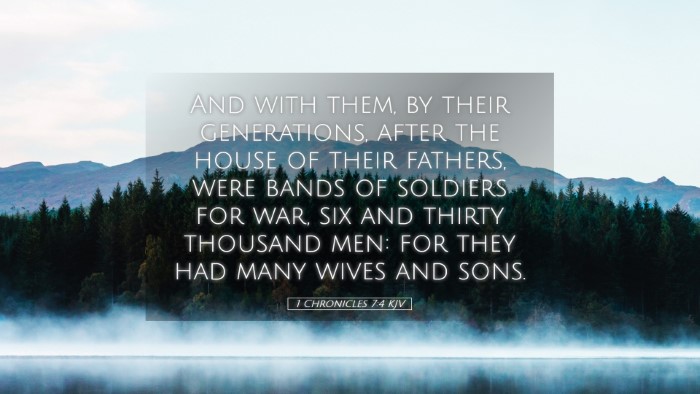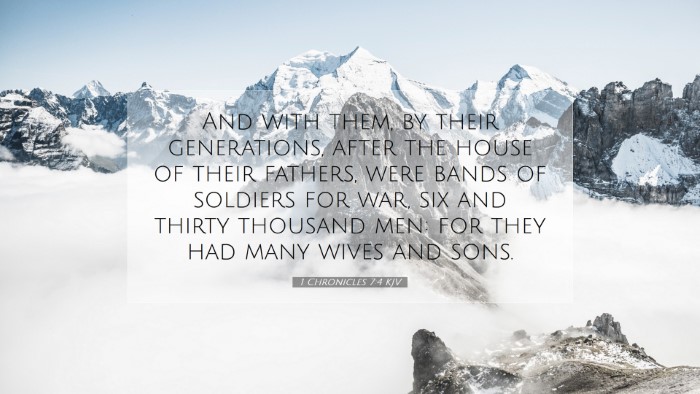Commentary on 1 Chronicles 7:4
Verse in Context: 1 Chronicles 7:4 states, "And with them, by their generations, after the house of their fathers, were bands of soldiers for war: six and thirty thousand men of war, for they had many wives and sons." This verse is embedded in a genealogical account that highlights the military and familial structure of the tribe of Ephraim.
General Overview
This verse draws attention to the military strength of the tribe of Ephraim, emphasizing the significant number of warriors it possessed. The tribes in Israel were not only considered based on their lineage but were also distinguished by their roles and contributions to the society, particularly in times of conflict.
Historical Context
Understanding Ephraim: Ephraim was one of the most prominent tribes in Israel, known for its military prowess and leadership. The tribe was often associated with conflicts faced by the Israelites and played a significant role during the period of the Judges and the monarchy.
Theological Insights
Military Significance: The mention of "bands of soldiers for war" illustrates the theocratic ideal of the nation of Israel, where warfare was seen as a necessity for survival and protection. The military capacity of the tribes reflected their faith as they sought God’s favor in battles.
Divine Providence: This verse reaffirms God’s providence in raising a strong military faction within Ephraim, which can also be viewed as a metaphor for spiritual readiness. Just as they were prepared for physical battles, believers are encouraged to be spiritually equipped for warfare against sin and temptation.
Commentary Insights
Matthew Henry's Insights
Matthew Henry emphasizes the significance of being prepared for conflict, both spiritually and physically. He notes how the size of the military force is a reflection of the population's ability to propagate and sustain their lineage through marriages. Henry highlights the paradox of being numerous yet having responsibilities that come with such strength — the need for faithfulness in both war and home life.
Albert Barnes' Perspective
Albert Barnes offers a detailed interpretation of the "bands of soldiers" in this context. He elaborates on the military organization and the societal structure of Israel, where divisions among families led to strategic formations in warfare. Barnes notes that the phrase "for they had many wives and sons" indicates the blessings of large families, which were essential for sustaining military strength.
Adam Clarke's Commentary
Adam Clarke provides a broader understanding by reflecting on the notion of society and warfare in ancient Israel. He discusses cultural implications of large families in relation to warfare and how it served the community. Clarke interprets the mention of "six and thirty thousand men" as illustrative of the community’s need for security, leadership, and obedience to God’s commands.
Spiritual Applications
This verse ultimately carries a profound message for contemporary readers. The attributes of leadership, familial obligations, and readiness for conflict are significant themes. The following applications can be drawn:
- Preparedness: Just as Ephraim was prepared for war, Christians today should be vigilant and ready for spiritual battles, equipping themselves with faith and knowledge of the Word.
- Familial Responsibilities: The importance of family is emphasized; believers are called to nurture their families while fostering spiritual growth within them.
- Community and Leadership: This verse serves as a reminder of the communal aspect of faith and how individuals contribute to the strength of the body of Christ. Leaders in the church and community are tasked with fostering unity and preparing the faithful for service.
Conclusion
1 Chronicles 7:4 not only highlights the military might of the tribe of Ephraim but also offers deep insights into the societal, familial, and spiritual dynamics that inform a believer’s life. By reflecting on the wisdom of historical commentaries, modern readers can appreciate the richness of scriptural narratives and apply these truths in various contexts of faith and leadership.


